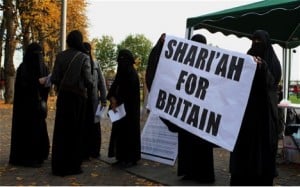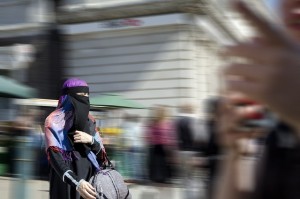Women of Hezbollah is a 50-minute film directed by Maher Abi Samra. It takes place between 1996 and 2000.
Ten years after the last Israeli aggression (and defeat) in south Lebanon, reviewing this documentary may sound anachronistic. But sometimes distance helps to get a more accurate insight about Hezbollah–a major political actor that is unjustly demonized most of the time. Getting a rational insight, not from experts but from real actors–women who are members of Hezbollah–offers revealing conclusions about the organization’s true orientations. In this associative social network of solidarity, women are not simply users or victims–they very often run things. According to the Lebanese journalist Walid Charara,
“women are playing a key role in the Hezbollah since the beginning. The goal of Hezbollah was not only to create a movement of resistance but also a society of resistance. It implied to run schools, dispensaries, hospitals, institutes dedicated to the surviving families of martyrs, etc.” [sic]
Abi Samra tells the story of two women, Zaynab and Khadije, whose personal narratives meet the narrative of resistance. He explores the social aspect of Hezbollah’s project through the lens of personal stories. He explains his film started with the meeting of a Zaynab:
“When I met Zaynab for the first time in 1996, she was 27 and had an impressive faith. Her husband Hadi was a fighter of the Hezbollah. From this meeting, sprung the desire to understand how this movement succeeded within a few years to capture people’s conscience. In 1996, Hezbollah had 12 deputies in the parliament. This religious party stemmed from the Shia community, one of the 17 communities that made up the Lebanese mosaic. Its legitimacy was mostly based on its resistance to the Israeli occupation of South Lebanon.” [sic]
Zaynab is the mother of three boys. The film-makers noticed her willingness to speak her mind freely, “far from a male’s official discourse.” He follows her in her daily activities with children, through their both serious and funny conversations. She also shares general reflections about life, most of them being very accurate moral reflections. She has a strong sense of duty. When she is asked about how she would react if her husband dies, she remains calm and offers dignified responses, perfectly conscious of what she is bearing on her shoulders.
This aspect of the film contradicts a very common prejudice about how Islamist movements relate to women: as male aggressors towards passive victims. In this documentary, women are actually empowered by their adhesion to Hezbollah. They are not afraid of their oppressors (the Israelis) and they keep up the resistance. Khadije tells a memory:
“I led the demonstration to the prison camp of Al-Ansar, the guardian asked us why we were there. He asked us: ‘What are you doing here?’ I replied with the same question: ‘What are you doing here?’ (…) It was really a word of truth in face of a tyrant. This man was talking to me surrounded by tanks and with 13,000 Israeli soldiers on Lebanese soil. Of course, I said it and ran away immediately because he starting shooting at us and there was no reason to stay there to die, but deep down I felt an indescribable happiness and I felt very strong.”
Khadije is the first woman to have been imprisoned in an Israeli camp, which is where she met the director of the film. One of the first memories she tells is of her mother, who left the house after her father married a second wife. The children and their mother moved to Beirut, and Khadije–at the age of 10–had to go to work in a textile factory, from six o’clock in the morning to six o’clock in the evening. As a consequence, she grew up under three oppressions: patriarchal, capitalist, and colonial (the expansion of Israel in south Lebanon). “Before arriving to Beirut, I had never realized that there were Muslims and Christians” she says. She adds, “I only used to distinguish between Jews and Arabs,” alluding to the context of colonization. Khadije understood the difference between Muslims and Christians when she heard a neighbor say: “She’s a beautiful girl, it’s a pity she’s a Muslim.”
The passage in the film when Khadije finds the factory of her childhood after so many years is simply devastating. She is walking in the streets of Beirut with her son (who died as a martyr in 2006, may Allah bring peace to him) and when they see the door after so many years, she starts laughing. But this laughter is mixed with tears and she ends up crying. The compassion for the poor child she was probably overwhelmed the incredibly dignified woman she became.
It’s important to keep in mind the centrality of fight against social injustice in these women’s experiences. Both of them are from rural and/or working-class backgrounds. Charara explains:
“The main objective of Islam is to establish social justice. In this perspective, the Islamic state is a regulative idea, not something Hezbollah wants to impose to Lebanon. Taking power from the state comes from a very recent conception, this of a European modern state. While in Islamic history, you always find a mistrust of theologians who were close friends of the ruling class.”
This film astutely mixes individual (and sometimes, very intimate) memories with Hezbollah’s regional history. In this perspective, the personal is definitely political and vice versa. For example, Khadije describes the experience of her first marriage as an aggression. “Suitors came in the village, I faced the fact I had to get married, leave school, work and all the rest,” she says with a melancholy smile. The separation of Khadije with her first husband in the late 1960s also coincides with her adhesion to the Palestinian Liberation Organization (PLO), when south Lebanon started to become the theater of confrontation it still is for Palestinian refugees, Lebanese people, and the Israeli army.
Watching this film reminded me of the documentary Flickering Flame, another political film directed by Ken Loach about a dockers’ strike in Liverpool. It was subtitled as “a lesson of morality.” One of the dockers’ wives, maybe the most shy among them, looked right on the eyes of a corrupted trade-unionist and simply said : “Please don’t insult the intelligence of the working-class.” Zaynab and Khadije’s testimonies are teaching us the same lesson of dignity that keeps up the fight against social injustice–from a Muslim woman’s perspective.













